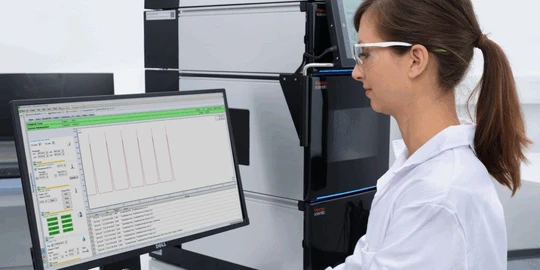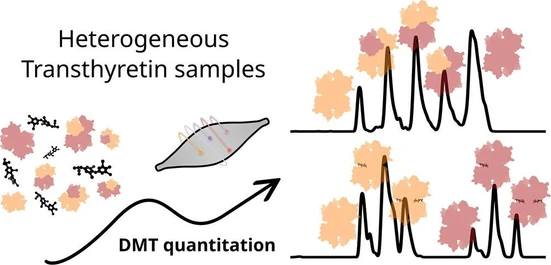News from LabRulezLCMS Library - Week 2, 2025

LabRulez: News from LabRulezLCMS Library - Week 2, 2025
Our Library never stops expanding. What are the most recent contributions to LabRulezLCMS Library in the week of 6th January 2025? Check out new documents from the field of liquid phase, especially HPLC and LC/MS techniques!
👉 SEARCH THE LARGEST REPOSITORY OF DOCUMENTS ABOUT LCMS AND RELATED TECHNIQUES
👉 Need info about different analytical techniques? Peek into LabRulezGCMS or LabRulezICPMS libraries.
This week we bring you applications by Shimadzu, Metrohm, and Waters Corporation, a presentation by Agilent Technologies, and a poster from MSACL by Thermo Fisher Scientific!
1. ALS Europe: Environmental Challenges of Pharmaceuticals: Persistence and Accumulation in Ecosystems
- Technical note
- Full PDF for download
The drugs are used extensively not only in human and veterinary medicine but are also widely found in livestock feed. Because pharmaceuticals are designed to be effective even at low concentrations, these specific contaminants can exist in the environment at extremely low levels. As with pesticides, these compounds can accumulate in different parts of the ecosystem. Since conventional wastewater treatment plants cannot adequately remove these substances, they are released into the environment, including surface and groundwater, and consequently into drinking water sources.
Pharmaceuticals as "New" Pesticides...
Pharmaceuticals represent a broad and chemically diverse group of substances that is continuously expanding and is characterised by a wide range of clinical effects and extensive use, often leading to overuse, in both human and veterinary medicine. From an environmental perspective, they are classified as organic micropollutants due to their presence in water at low concentrations (ranging from ng/L to μg/L). Both the public and experts are concerned not only about their negative impacts on natural ecosystems but also about their presence in drinking water and the related effects on human health. Their contribution to the emergence of antimicrobial resistance (AMR) is also significant, as it greatly complicates the treatment of infectious diseases and represents a major challenge for current and future medicine.
Drugs can enter the environment through various pathways. One of the primary sources of contamination is wastewater from households and health and social care facilities, which contains human urine and faeces, as well as unused or expired pharmaceuticals. Another significant source is wastewater from the pharmaceutical industry. Consequently, wastewater treatment plants (WWTPs) themselves become sources of environmental contamination, as they are unable to effectively remove pharmaceuticals, allowing them to be transported further into the environment [1].
ALS Laboratories have developed and accredited a multiresidue methods for the determination of more than 100 different pharmaceuticals and their metabolites in various types of water. All of our analytical methods use the LC/MS/MS technique for analytes determination, which provides high sensitivity, selectivity and precision of measurement and allows the determination of target compounds at the very low limits required for residue analysis.
2. Thermo Fisher Scientific: Orbitrap Astral MS Literature List: Rethink what is possible
Bacterial Proteomics, Drug Resistance, Crosslinking-MS, Metaproteomics, Data Analysis, Mamalian Development, Oxidation, Plant Proteomics, Phosphoproteomics, Plasma Proteomics, Single-Cell Proteomics, Reproducibility, Spatial Proteomics, Salivary Proteome, Technology, Tissue Proteomics, Ubiquitylation, Vaccine Research, Whole Proteome
3. Agilent Technologies: Easy and Fast Automation of Sample Preparation
- Application
- Full PDF for download
Sample preparation using injector workflows with the Agilent 1260 Infinity III Multisampler and Vialsampler.
The demand for automated workflows is increasing as the number of samples in the lab continues to grow, but implementing automation in the lab environment is difficult, time-consuming, and costly. This technical overview describes an alternative method for implementing an automation method quickly and easily for sample preparation. This includes derivatization of amino acid samples, sample dilution, and preparation of calibration standards using an Agilent 1260 Infinity III Multisampler or Agilent 1260 Infinity III Vialsampler in combination with injector workflows. The results obtained were excellent in terms of precision, repeatability, and sensitivity, and are independent of the operator's skills.
The 1260 Infinity III LC comprised the following modules:
- Agilent 1260 Infinity III Binary Pump (G7112B)
- Either: Agilent 1260 Infinity III Vialsampler (G7129A) with Integrated Column Compartment (G7130A), 100 μL analytical head and 100 μL sample loop (default setup)
- Or: Agilent 1260 Infinity III Multisampler (G7167A) with 100 μL analytical head and 100 μL sample loop (default setup) and additional Multicolumn Thermostat (G7116A)
- Agilent 1260 Infinity III Variable Wavelength Detector (VWD) (G7114A), equipped with a 10 mm standard flow cell (14 μL, option #018)
- Agilent 1260 Infinity III Fluorescence Detector Spectra (FLD) (G7121B), equipped with an 8 μL FLD cell (G1321-60005)
Agilent OpenLab CDS version 2.8 or later
Columns
- Agilent InfinityLab Poroshell 120 EC-C18, 2.1 × 50 mm, 2.7 μm (part number 699975-902)
- Agilent AdvanceBio AAA LC column, 3.0 × 100 mm, 2.7 μm (part number 695975-322) with Agilent AdvanceBio AAA guard column, 3.0 × 5 mm, 2.7 μm (part number 823750-946)
Injector workflows, in combination with the Agilent 1260 Infinity III Multisampler or Agilent 1260 Infinity III Vialsampler enable automation of certain sample preparation methods such as derivatization of amino acids, sample dilution, and preparation of calibration standards with excellent precision, repeatability, and sensitivity. The injector workflow differs from the conventional injector program in its ability to set up methods faster and easier without error, saving time and cost.
4. Waters Corporation: Evaluation of Modern and Legacy HPLC Systems for the Size-Exclusion Analysis of Aggregation and Fragmentation in a Monoclonal Antibody Drug
- Application
- Full PDF for download
Size-exclusion chromatography is a widely used characterization technique for the analysis of aggregation and fragmentation of monoclonal antibody drugs. Traditional high-performance liquid chromatography systems have a large amount of extra-column dispersion which makes size-exclusion data analysis difficult due to band broadening and increased peak tailing. Additionally, biologic analytes may experience non-specific adsorption throughout the chromatographic flow path, further increasing the effects of peak tailing. The Alliance™ iS Bio HPLC System addresses both concerns by offering lower system dispersion than legacy HPLC systems alongside a bio-inert flow path employing MaxPeak™ High-Performance Surfaces Technology.
In this work an Alliance iS Bio HPLC System, an Alliance e2695, and a competitive Bio-inert HPLC system are compared using a size-exclusion method for analysis of monoclonal antibody aggregation and fragmentation. Dispersion on each system is determined and the Alliance iS Bio HPLC is shown to have the lowest 4σ dispersion. This translates to lower peak tailing, tighter peak width, and a more accurate measurement of low- molecular weight species of infliximab due to lower monomer peak tailing and better monomer resolution.
Benefits
- Biocompatible system for use in salty bio-applications
- MaxPeak HPS for reduced off-target analyte interaction results in less peak tailing
- Low system dispersion results in better fragmentation determination
5. Shimadzu: Rapid Screening of 501 Emerging Contaminants in Water Using Polarity-Extended Liquid Chromatography-Mass Spectrometry
- Application
- Full PDF for download
User Benefits
- Polarity-Extended Liquid Chromatography combines hydrophilic interaction chromatography and reversed-phase chromatography to achieve simultaneous analysis of polar and weakly polar compounds.
- This method can detect 501 emerging contaminants, offering a broad scope in terms of both quantity and variety.
- The water sample is concentrated using freeze-drying method, effectively recovering both polar and non-polar compounds are recovered well.
Introduction
In recent years, water pollution has become increasingly serious, and the problem of emerging pollutants in water has attracted much attention. Traditional analytical methods for emerging pollutants mainly focus on 1-2 categories of emerging pollutants and pay less attention to strongly polar pollutants. The Polarity-Extended Liquid Chromatography, through patented technologies such as polarity splitting, online dilution, and dual gradients, combines a Hilic column (first dimension) and a C18 column (second dimension), which can broaden the polarity analysis range of compounds and achieve simultaneous analysis of polar and weakly polar compounds. Fig. 1 shows the Polarity-Extended Liquid Chromatography-Mass Spectrometry System.
In this paper, a method for rapid screening of 501 emerging pollutants was established by using Shimadzu's Polarity-Extended Liquid Chromatography-Mass Spectrometry System. This method solves the problem of simultaneous analysis of strong and weak polar pollutants.
Conclusion
In this study, a method for detecting emerging pollutants in water by combining the Polarity-Extended Liquid Chromatography and LCMS - 8050 series coupling system was established. This method combines hydrophilic interaction chromatography and reversed - phase chromatography to achieve the simultaneous separation of polar and non - polar compounds with a single injection. The detection of 501 emerging pollutants was achieved within 28 minutes. The linearity and repeatability of the method meet the quantitative requirements. After pretreatment operations such as freeze - drying, re-dissolution, and nitrogen blowing of the samples, the recovery rates for most compounds were satisfactory. This method has been successfully used for the rapid screening of new pollutants in tap water and sewage. The combination of Polarity-Extended Liquid Chromatography and mass spectrometry enables the one-injection analysis of compounds with different polarities without significantly increasing analysis time, making it suitable for the rapid screening of emerging pollutants in water.
6. Metrohm: Installation Instruction for ProfIC Vario 7 Anion
- Manual
- Full PDF for download
The ProfIC Vario 7 Anion is a Professional IC Vario system with Inline Dilution and Inline Dialysis for the fully automatic determination of anions with sequential suppression in very high concentrations in matrices containing emulsions. This system enables users to dilute the sample and eliminate droplets of fat or organic solvents or particles prior to the analysis.




